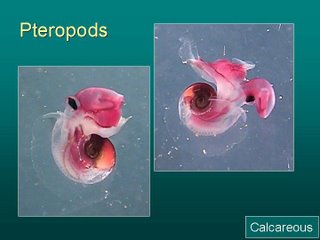
Isn't this a gorgeous little creature. They produce large mucous nets to capture their prey and their carbonate shells produce pterapod ooze on the sea floor. Along with gastropods and coccolithospores they make their shells or skeletons from calcium carbonate and they're the base of the food chain. Coral reefs also use calcium carbonate to grow.
Calcium carbonate comes in two forms, aragonite and calcite, aragonite being the more soluable. C02 is one of the causes of global warming and C02 is changing the acidity of the oceans so fast that scientists have calculated that the absorption of C02 could make the oceans more acid over the next few centuries than they have been for 300 million years apart from a few catastrophic events.
One of these events occured 65 million years ago, the Chixulub meteorite impact could have caused the release of sulphur dioxide on the surface layers of the oceans. Most of the calcerous plankton went extinct and coral disappeared for two million years. This disappearance is clearly seen in the fossil records.
The other event, 55 million years ago, which scientists think was the unexplained release of methane hydrates from the ocean floor which oxidised to C02, turning the oceans acidic. It's been calculated that around 4500 gigatonnes of carbon caused this acidification and it took over 100,000 years to return to normal alkalinity.
Corals could become rare by the middle of the century not only because of rising water temperatures but falling carbonate levels. These are corals in saturated aragonite water but the high latitude deep water corals which grow near the aragonite saturation limit could decline more rapidly. These corals grow at 100 to 1000 metres down. One reef system stretches from Norway down to the coast of Africa. Scientists have only started to study these reefs, their biodiversity and importance to fish life.
The oceans naturally absorb 0.1 gigatonnes more C02 per year than they release and at the moment they are soaking up an extra 2 gigatonnes a year. This is more than 20 times the natural rate. This doesn't mean the oceans will be devoid of life, just that the diversity will be drastically reduced.
The scientists could be wrong. But in experiments, the shells of pterapods start dissolving in two days, in water at the pH level predicted for 2050. That's only an estimate, it could happen much sooner.
5 comments:
Hi, JT,
Thanks for the beautiful pink faeries. I've just watched the new movie, An Inconvenient Truth, about global warming. The next generation is not going to have a very nice world in which to live.
Al Gore hasn't had a good reception from what we call the 'rightwingdeathbeasts' in the newspapers or on their blogs. I haven't seen the film but he comes across quite well in the interviews.
Yes, I was surprised to see in the movie that Australia as well as the US didn't acknowledge Kyoto. Sickening.
Only two countries in the world wouldn't sign and the repulsive rodent who runs this country as his private fiefdom sided with the Shrub.
Aren't there proposals about at the moment to bury great big globs of C02 underneath the ocean floor?
Post a Comment